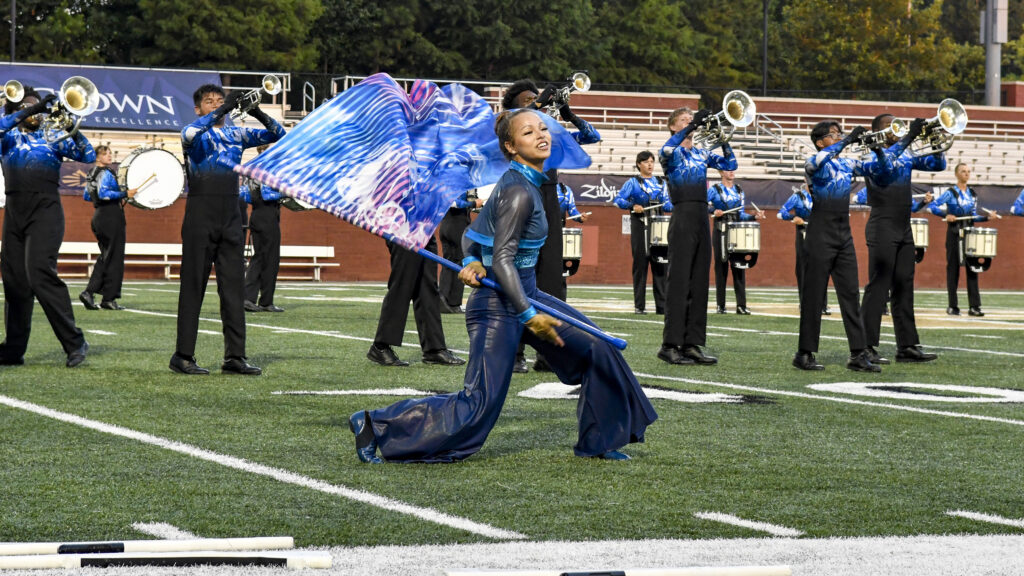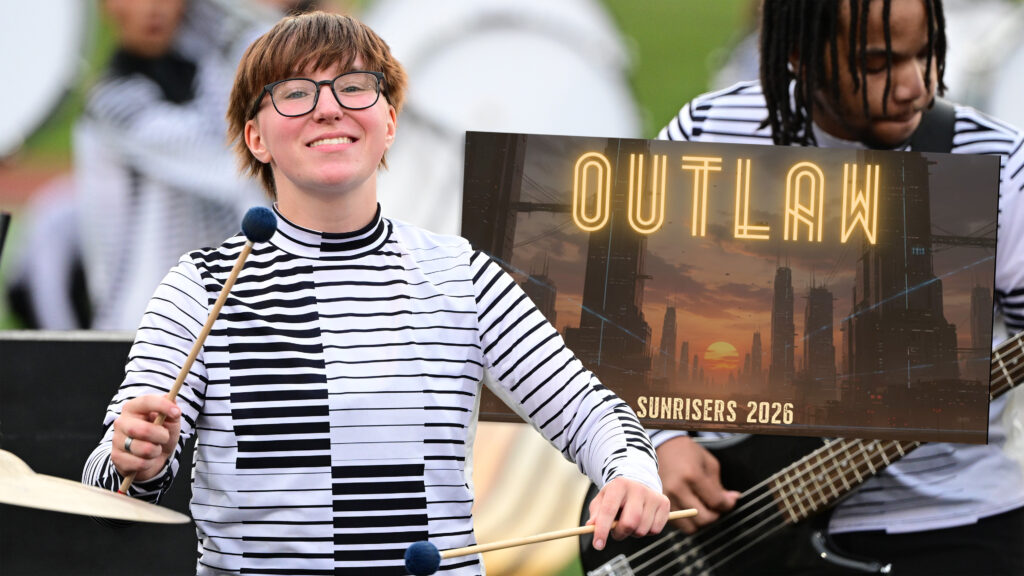As the 2017 DCI World Championships returned to Lucas Oil Stadium in Indianapolis, the Blue Devils celebrated their 60th anniversary while winning the corps’ 18th championship title on way to an undefeated season.
Less than a point behind, Santa Clara Vanguard also celebrated a milestone season in 2017 utilizing numerous wheels/stage sets that turned gold in recognition of the corps’ 50th anniversary. Third place went to Carolina Crown who “destroyed” the field, one hash mark at a time. The Cavaliers popped into the top-four for the first time since 2011, topping Bluecoats’ “Jagged Line” by a slim margin.
Boston Crusaders finished in the top half of finalists for the first time since 2003 while The Cadets took seventh place with a rendition of Bernstein’s “Mass” that prominently featured a vocal choir. The Madison Scouts captured the final position in Finals with a show as musically shocking as were the post-apocalyptic visuals.

Set amid a musical landscape of sweeping symphonic scores and dark textures, Phantom Regiment’s ninth-place production, “Phantasm,” explored the stark contrasts between the real and the unreal. With their faces obscured at the start of the show by red mesh, the color guard members were intended as intruders in one’s mind. The seductive, powerful characters helped propel the storyline throughout the production.
The show opened with the mournful, sustained long notes from the beginning of Maurice Jarre’s “Entering the Nightmare” from the 1984 film, “Dreamscape,” a piece that would be featured a few minutes later. Narrated words including “fantasy” and “phantasm” were heard in a dreamlike manner over the speakers, almost as a whisper in the ears of someone about to lose consciousness to sleep. The color guard members swirled their black cloaks as if malevolent spirits, the red covers over their faces adding to the spookiness of what they represented.
The brass section then played “Revolutionary Petrograd,” the solemn beginning of Dmitri Shostakovich’s 1961 “Symphony No. 12,” subtitled, “The Year 1917.” An original fanfare of a minor key realization of the show-ending “Finlandia” melody foreshadowed the events to come.
Visually, the color guard’s rifle spinners and red flags kept intruding on the horn line. Eventually all picked up flags in front of the brass players, at that point exercising full control over the circumstances, and letting all know they were now in charge.
The final section of the symphony, “The Dawn of Humanity,” brought the proceedings to a temporary, glorious climax. The color guard performers removed their black cloaks to become a visible part of the psyche, demonstrating they were aware they were in control and no longer had to hide behind cover.
The narration of the words from the beginning of the show returned during Maurice Jarre’s “Entering the Nightmare,” from the 1984 film, “Dreamscape.” Horn players held onto the fabric of the color guard’s red masks as the phantasms spun around and performed somersaults, the fabric eventually coming off to make the phantasms appear human.

Percussionists led into the cataclysmically violent middle portion of the Jarre work, that delivered pounding jabs of chords that drilled through the soul. By the end of the movement, the phantasms/fantasies were in control, continuously pushing around the horn players and drummers as the word “madness” was repeated through the speakers.
The phantasms tried to deal the final blow to the rest of the corps during the hauntingly beautiful second movement of Sergei Rachmaninoff’s “Piano Concerto No. 2 in C minor,” composed in 1900-1901. At this point the corps wandered into a monument of Regiment’s past, the traditional white helmets that were inconspicuously set on the field before the start of the show. This occurred during another foreshadowing of “Finlandia,” heard in a soaring female voice with percussive mallet accompaniment.
One color guard member, dressed in a white gown slipped over her red costume, lifted up a white helmet while being raised up by a brass player, starting the process of the corps regaining control of its own destiny by gaining strength from their storied tradition. The movement ended with the horns gloriously proclaiming victory, getting the upper hand before the tender melody returned in the voice of a solo flugelhorn.
Aram Khachaturian composed the one-movement “Symphony No. 3” in 1947 for the 30th anniversary of the same Russian revolution for which Shostakovich composed the show’s opener 14 years later.
During this part of the show, the horns (now all wearing the white helmets) and the color guard performers were engaged in the final battle between reality and fantasy, with four trombones up front making the initial statement as brash as possible. The horns traded off some wicked musical runs originally played by a pipe organ, and as the entire guard slipped on white cloaks, the transition of reality gaining control was complete.
This evolved into a glorious statement of the main theme of Jean Sibelius’ “Finlandia,” written in 1899 to express the desire for self-control of the Finnish people who were living under the oppressive yoke of the Russian Empire. Interestingly, Finland declared the piece its national anthem in 1917; the same year the country declared independence from Russia and the same year of the Bolshevik Revolution referenced in the title of the Shostakovich piece. That little factoid was made significant when a little bit of the triumphant statement of the earlier Shostakovich work was superimposed upon the Sibelius piece.
2017 Phantom Regiment – "Phantasm"

Michael Boo was a member of the Cavaliers from 1975-1977. He has written about the drum corps activity for more than 35 years and serves as a staff writer for various Drum Corps International projects. Boo has written for numerous other publications and has published an honors-winning book on the history of figure skating. As an accomplished composer, Boo holds a bachelor's degree in music education and a master's degree in music theory and composition. He resides in Chesterton, Indiana.





